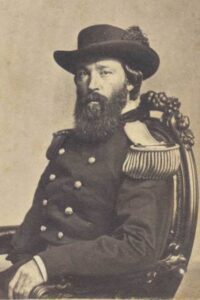On the Road to Atlanta: Two Irishmen
Some fascinating characters populate the American Civil War. One of those is the one-armed Union XI Corps divisional commander Brigadier General Thomas Sweeny, whose military ardor was not the slightest bit dampened by either the loss of his limb in Mexico or the slaughter he had experienced so far in the current struggle.
On May 20th, Sherman’s and Johnston’s armies paused for a few days for rest, recovery, and resupply. Soldiers on both sides took advantage of that pause, and a flurry of letter-writing ensued. However, not all the letters were sent back home.
Here occurred one of the more unusual inter-army communications of the war, between Thomas Sweeny and Confederate division commander Patrick Cleburne, who were both Irish. Each was born in County Cork, Sweeny in 1820 and Cleburne eight years later. Sweeny was a prominent member of the Fenians, an Irish secret society dedicated to freeing the Emerald Isle from English rule. Already thinking of the fight to come Sweeny sent a letter across the lines inviting Cleburne to join him after the war in raising an Irish army-in-exile, jointly comprised of blue and gray veterans, intending to liberate their native island. Unimpressed, Cleburne replied that “after this war closed, he thought both would have had fighting enough to satisfy them for the rest of their lives.”[1]
Cleburne, of course, did not live to see the end of the war. He was killed in action at Franklin. Despite his handicap, Sweeny was relieved of command after the Battle of Atlanta, since he assaulted his corps commander, Maj. Gen. Grenville Dodge-who had presumed to issue an order to one of Sweeny’s brigades without going through Sweeny, which the Irishman regarded as an affront. Surprisingly, he was acquitted at his court-martial. Sweeny did live to realize his dream, helping to organize and lead the short-lived Fenian invasion of Canada in 1867 (intending to trade Canada for Ireland’s Independence.) Unsurprisingly, this mad scheme also failed. Still, Sweeny was not kicked out of the army, retiring as a major, and dying peacefully in 1892.
[1]Irving A. Buck, Cleburne and His Command (Dayton, OH: 1982), 213.

The Fenian Raid by Irish Civil War Veterans happened in June 1866, not 1867. Sweeny lead the failed Canada East invasion.
Why is the phrase “Mad dogs and Englishmen…”? We Irish have them beat all to hell!
This is a very fascinating tale. Notably the two faced off at Shiloh in the late afternoon near Cavalry Field.